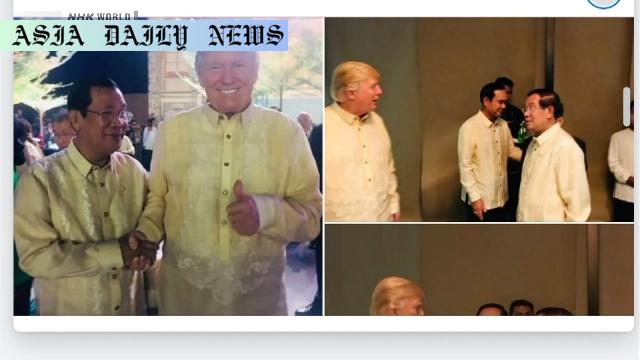Voice of America: Cambodian Senate President Hun Sen supports Donald Trump’s decision to dismantle US-funded media outlets.

Understanding the Shutdown of Voice of America
The recent decision by former U.S. President Donald Trump to dismantle federally funded media outlets such as Voice of America (VOA) and Radio Free Asia (RFA) has triggered widespread discussions on the state of global journalism and freedom of speech. These organizations, renowned for their mission to deliver unbiased information to those living under regimes lacking press freedom, have faced scrutiny under new leadership. Through an executive order, Trump aimed to minimize the influence of the parent agency overseeing these entities, fundamentally altering their capacity to function as intended.
In countries like Cambodia, the announcement invoked notable responses. Cambodian Senate President Hun Sen, a figure often criticized for oppressive measures against independent media, publicly applauded Trump’s bold move. On his official Facebook page, he lauded the decision as an act of courage in combating ‘fake news.’ Support from a leader often accused of stifling journalistic voices raises questions about the broader implications of disabling media structures designed to champion press freedom in authoritarian regimes.
The Role of VOA and RFA in Combating Media Oppression
For decades, both VOA and RFA have served as essential tools for disseminating unbiased news in regions where government censorship dominates. Their ability to provide reliable information has been critical for many under oppressive governments without access to independent journalism. Critics of Trump’s decision, including VOA Director Michael Abramowitz, argue that dismantling these agencies disarms an essential mechanism to foster a free and informed global society. “Those living under tyranny,” Abramowitz noted, are losing a reliable ally in the fight against authoritarian propaganda. The absence of these platforms may leave communities vulnerable to unchecked government narratives.
Furthermore, opposition to this move draws attention to the broader attack on media independence. Right-wing sentiments accusing institutions like VOA of political bias have fueled debates on media transparency. However, minimizing these platforms erodes credibility for U.S.-led initiatives aimed towards safeguarding freedom and democracy, thus affecting not just domestic, but also global trust.
Implications for Cambodia and Southeast Asia
Cambodia is likely to feel immediate ramifications of this controversial decision. The country already ranks poorly on the Press Freedom Index, with its government having a reputation for muzzling dissenting voices. By undermining international outlets such as VOA and RFA, Trump’s executive order inadvertently strengthens such regimes. Cambodia’s news ecosystem, heavily influenced by government messaging, may soon find it easier to suppress discussions around controversial topics.
Moreover, the absence of trustworthy foreign media could exacerbate misinformation and deepen public mistrust of journalism. Cambodia’s youth, activists, and researchers relying on these global platforms will face challenges in accessing reliable news narratives. Considering ASEAN’s collective struggle with media freedom, this decision risks emboldening other authoritarian governments in the region to further oppress independent journalism.
Debating the Ethics and Future of Media Funding
This decision underscores longstanding debates over the ethics of government-funded journalism. Does reliance on government funding compromise the independence of media outlets? Critics of VOA have long branded it as a propaganda tool, while its defenders emphasize its role in bridging the news gap in oppressed regions. With Trump’s directive, these debates take center stage as advocates highlight the delicate balance between public funding and editorial freedom.
Trump’s shutdown undeniably weakens America’s ability to leverage soft power globally. Media initiatives like VOA were instrumental in shaping diplomatic communication strategies during the Cold War. While modern-day geopolitics makes this role equally essential, the shutdown demonstrates a significant shift in U.S. policies away from fostering global values of freedom and democracy.
Conclusion: A Future Without Voice of America
In conclusion, the dismantling of Voice of America and Radio Free Asia represents much more than a simple budgetary or bureaucratic shift. It affects millions, from struggling journalists trying to report fearlessly to global citizens yearning for truth. As nations like Cambodia respond positively to the decision, the responsibility to ensure the survival of credible journalism falls upon global civil society and independent media organizations. Ultimately, this move sets a precedent that risks undermining the fight for press freedom worldwide, urging stakeholders across industries to reflect on the enduring value of publicly funded media.
Commentary
The Complex Impact of Voice of America’s Shutdown
The decision to dismantle Voice of America and Radio Free Asia invokes a wide range of reactions, from applause in authoritarian regimes to criticism from press freedom advocates. Personally, I believe this move reflects a deeper erosion in the global perception of free speech—a value that has long been considered a cornerstone of democratic societies. While proponents argue about the need to curb biased media, dismantling platforms that provide news to oppressed regions feels disproportionately harmful, especially to the communities that rely on impartial reporting.
Freedom of Speech Under Scrutiny
The endorsement of Trump’s decision by Cambodian leader Hun Sen sparks alarm. His public appreciation highlights a stark reality—those resistant to free, independent media stand to gain the most from this controversial measure. Given Cambodia’s dismal record on press freedom, one wonders what message such encouragement sends. This move could embolden governments like Cambodia’s to further repress journalistic efforts, capitalizing on the absence of credible external perspectives. This is particularly concerning for Southeast Asia, a region grappling with authoritarianism and media repression.
Lessons for the Global Community
From a broader viewpoint, this decision raises critical questions about the ethics of state-funded journalism. How do we ensure public funding fosters unbiased reporting rather than political influence? The global community must use this scenario to evaluate alternative ways of financing journalism to enhance both credibility and independence. It’s also an opportunity for civil society and independent organizations to step up and fill the gaps created by the loss of Voice of America.
Ultimately, this decision risks undermining decades of progress in championing free speech. As we move forward, safeguarding journalism must remain a shared responsibility globally, irrespective of political divides.


